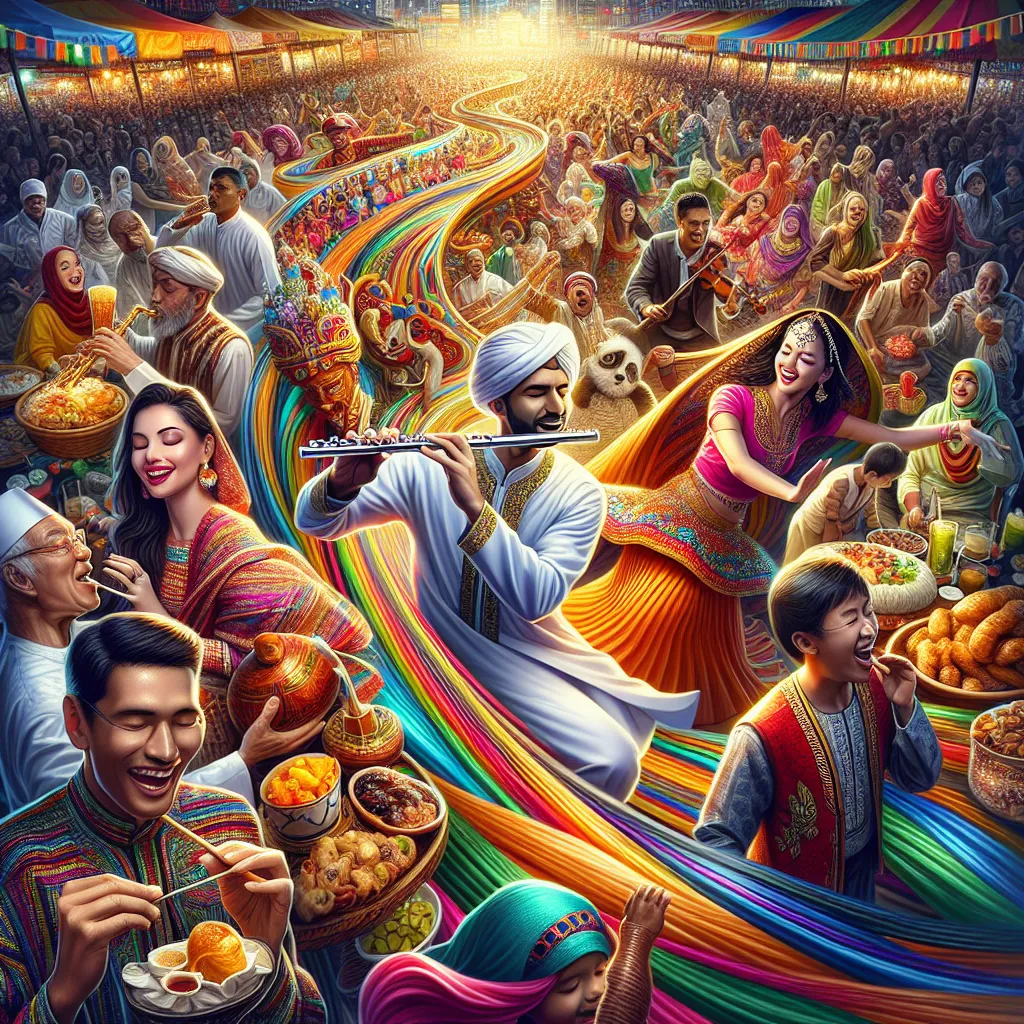Cultural events are a common topic in IELTS Speaking tests, particularly in Part 2. Being able to vividly describe such experiences can significantly boost your score. This guide will help you prepare for questions related to cultural events, with sample answers and expert tips to excel in your IELTS Speaking exam.
Nội dung bài viết
- Understanding the Topic
- Part 1: Introduction and Interview
- Sample Question 1: Do you enjoy attending cultural events?
- Sample Question 2: What was the last cultural event you attended?
- Part 2: Long Turn (Cue Card)
- Cue Card
- Sample Answer (Band 8-9)
- Follow-up Questions
- Part 3: Two-way Discussion
- Question 1: How do you think cultural events contribute to a society’s identity?
- Question 2: Do you think globalization is causing traditional cultural events to disappear?
- Key Vocabulary and Phrases for High Scores
- Expert Advice
Understanding the Topic
Cultural events can include festivals, ceremonies, celebrations, or any gathering that showcases a particular culture’s traditions, customs, or heritage. This topic allows examiners to assess your ability to describe experiences, express emotions, and discuss cultural aspects.
 Cultural Event IELTS Speaking
Cultural Event IELTS Speaking
Part 1: Introduction and Interview
In Part 1, you may be asked general questions about cultural events. Here are some potential questions and sample answers:
Sample Question 1: Do you enjoy attending cultural events?
Band 6-7 Answer:
“Yes, I do enjoy cultural events. They’re a great way to learn about different traditions and meet new people. I try to attend local festivals whenever I can.”
Band 8-9 Answer:
“Absolutely! I’m passionate about immersing myself in various cultural experiences. Cultural events offer a unique window into different traditions and ways of life. I find them not only entertaining but also incredibly enriching on a personal level.”
Sample Question 2: What was the last cultural event you attended?
Band 6-7 Answer:
“The last cultural event I attended was a Chinese New Year celebration in my city. It was colorful and lively, with dragon dances and delicious food.”
Band 8-9 Answer:
“I recently had the privilege of attending a vibrant Chinese New Year celebration in my city. It was a feast for the senses, featuring spectacular dragon dances, intricate lantern displays, and an array of mouth-watering traditional delicacies. The event truly brought the rich tapestry of Chinese culture to life.”
Part 2: Long Turn (Cue Card)
In this section, you’ll be given a cue card with a topic to speak about for 1-2 minutes. Here’s a sample cue card related to cultural events:
Cue Card
Describe a time when you experienced a cultural event.
You should say:
- What the event was
- Where and when it took place
- Who you were with
- And explain why this event was memorable for you
Sample Answer (Band 8-9)
“I’d like to share my experience of attending the vibrant and enchanting Holi festival in India last year. Holi, also known as the Festival of Colors, is a centuries-old Hindu celebration that marks the arrival of spring and the triumph of good over evil.
The event took place in March, in the bustling streets of Jaipur, often referred to as the Pink City. I was fortunate enough to be there with a group of close-knit friends, both locals and fellow travelers, which added to the magic of the experience.
What made this event truly unforgettable was the sheer exuberance and sense of unity it fostered. As we joined the crowds, we were enveloped in a kaleidoscope of colors. People of all ages were gleefully throwing vibrant powders and water at each other, their laughter echoing through the air. The atmosphere was electric, with traditional music pulsating through the streets and the aroma of sweet delicacies wafting from nearby food stalls.
One particularly poignant moment stands out in my memory. An elderly local gentleman, his face beaming with joy, approached our group and gently dabbed our cheeks with purple powder, welcoming us to the celebration. This simple gesture of inclusion touched me deeply and epitomized the spirit of Holi – a celebration that transcends cultural and social boundaries.
The event was not just a feast for the senses but also a profound cultural immersion. It gave me a newfound appreciation for Indian traditions and the power of communal celebrations to bring people together. The Holi festival left an indelible mark on me, serving as a vivid reminder of the beauty of cultural diversity and the universal language of joy and togetherness.”
Follow-up Questions
- How did this experience change your perspective on Indian culture?
Band 8-9 Answer:
“This experience profoundly transformed my understanding of Indian culture. It revealed the depth of community spirit and the intricate interplay between tradition and modernity in Indian society. I was struck by how such an ancient festival continues to resonate so powerfully with people of all ages and backgrounds, fostering a sense of unity and joy. It challenged my preconceptions and gave me a more nuanced appreciation of the vibrancy and diversity within Indian culture.”
- Do you think cultural events are important in today’s globalized world?
Band 8-9 Answer:
“Absolutely. In our increasingly globalized world, cultural events play a crucial role in preserving and celebrating diversity. They serve as vital links to our heritage and foster cross-cultural understanding. These events provide a tangible connection to traditions that might otherwise be lost in the rush of modernization. Moreover, they offer a unique platform for cultural exchange, helping to bridge divides and promote empathy between different communities. In essence, cultural events act as powerful antidotes to the homogenizing effects of globalization, ensuring that our rich tapestry of global cultures continues to thrive and evolve.”
Part 3: Two-way Discussion
In Part 3, the examiner will ask more abstract questions related to the topic. Here are some potential questions and sample answers:
Question 1: How do you think cultural events contribute to a society’s identity?
Band 6-7 Answer:
“Cultural events are important for society’s identity. They help people remember their traditions and history. These events bring communities together and make people proud of their culture.”
Band 8-9 Answer:
“Cultural events play a pivotal role in shaping and reinforcing a society’s identity. They serve as living repositories of a community’s heritage, encapsulating centuries of traditions, beliefs, and shared experiences. These events act as a cultural touchstone, allowing people to connect with their roots and reaffirm their collective identity.
Moreover, cultural celebrations often serve as a bridge between generations, facilitating the transmission of knowledge and values. They provide a tangible link to the past while simultaneously evolving to remain relevant in the present, thus ensuring the continuity of cultural identity.
Additionally, these events often become emblematic of a society, attracting visitors and garnering international recognition. This external appreciation can bolster a community’s sense of pride and further solidify their cultural identity. In essence, cultural events are not merely entertainment, but vital instruments in preserving, celebrating, and evolving a society’s unique character.”
Question 2: Do you think globalization is causing traditional cultural events to disappear?
Band 6-7 Answer:
“Globalization has some effects on cultural events. Some traditions might be lost as people adopt more modern lifestyles. However, many people still value their cultural heritage and work to preserve it.”
Band 8-9 Answer:
“The relationship between globalization and traditional cultural events is indeed complex and multifaceted. While it’s true that globalization has posed challenges to some traditional practices, I wouldn’t say it’s causing them to disappear entirely. Rather, it’s catalyzing a transformation in how these events are perceived and celebrated.
On one hand, globalization has undeniably led to some homogenization of cultures, potentially diluting the uniqueness of certain traditions. The influx of global media and the adoption of Western lifestyles in many parts of the world can sometimes overshadow local customs.
However, globalization has also paradoxically sparked a renewed interest in cultural heritage. As the world becomes more interconnected, many communities are becoming increasingly aware of the importance of preserving their unique identities. This has led to efforts to revitalize and even reinvent traditional events, often incorporating modern elements while maintaining their core essence.
Moreover, globalization has provided new platforms for sharing and celebrating cultural events on a global stage. Social media and international tourism have allowed these traditions to reach wider audiences, often leading to their appreciation and adoption by people from different cultural backgrounds.
In conclusion, while globalization presents both challenges and opportunities for traditional cultural events, I believe it’s more accurate to say that it’s reshaping rather than erasing these important cultural practices. The key lies in finding a balance between preserving authenticity and adapting to the changing global landscape.”
Key Vocabulary and Phrases for High Scores
-
Vibrant /ˈvaɪbrənt/ (adjective): Full of energy and life.
Example: “The festival was a vibrant celebration of local culture.” -
Immerse /ɪˈmɜːrs/ (verb): To involve oneself deeply in a particular activity or interest.
Example: “I love to immerse myself in different cultures when I travel.” -
Tapestry /ˈtæpɪstri/ (noun): Used metaphorically to describe a complex or varied series of things.
Example: “The event showcased the rich tapestry of Indian traditions.” -
Enchanting /ɪnˈtʃɑːntɪŋ/ (adjective): Delightfully charming or attractive.
Example: “We were captivated by the enchanting music and dance performances.” -
Profound /prəˈfaʊnd/ (adjective): Very great or intense.
Example: “The experience had a profound impact on my understanding of the culture.” -
Epitomize /ɪˈpɪtəmaɪz/ (verb): To be a perfect example of something.
Example: “The festival epitomized the community’s spirit of unity and joy.” -
Resonates /ˈrezəneɪts/ (verb): To evoke or suggest images, memories, and emotions.
Example: “The traditional music resonated deeply with the audience.” -
Nuanced /ˈnjuːɑːnst/ (adjective): Characterized by subtle shades of meaning or expression.
Example: “The event gave me a more nuanced understanding of their customs.”
Expert Advice
To excel in describing cultural events in your IELTS Speaking test:
- Build a diverse vocabulary: Use descriptive adjectives and idiomatic expressions to bring your experience to life.
- Practice storytelling: Structure your answer with a clear beginning, middle, and end.
- Show cultural awareness: Demonstrate your understanding of the event’s significance in its cultural context.
- Express personal reflection: Share how the experience affected you or changed your perspective.
- Use varied sentence structures: Mix simple and complex sentences to showcase your language skills.
- Incorporate sensory details: Describe sights, sounds, smells, and textures to make your account vivid.
Remember, authenticity is key. Even if you haven’t experienced many cultural events, you can still score well by discussing a small local celebration or a cultural experience you’ve learned about in detail.
By following these guidelines and practicing regularly, you’ll be well-prepared to tackle questions about cultural events in your IELTS Speaking test, potentially boosting your score significantly.
For more IELTS Speaking tips, check out our guide on describing a person who has inspired you to stay active or describing a social media campaign that caught your attention.


